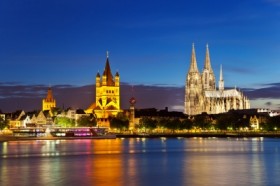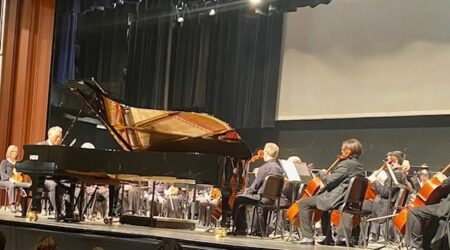First Impressions: Cologne, Germany
I’ve recently decided to take a long overdue break from my time in France. I considered Italy, but wisely decided against it because I know myself well enough to acknowledge that three months anywhere in the country responsible for pizza and tiramisu would render me obese. Germany seemed like the next most logical choice. After […]
I’ve recently decided to take a long overdue break from my time in France. I considered Italy, but wisely decided against it because I know myself well enough to acknowledge that three months anywhere in the country responsible for pizza and tiramisu would render me obese. Germany seemed like the next most logical choice. After weeks of researching the best city in which to build my next temporary nest, I settled on Cologne.
Cologne was not my first choice because I was initially looking for something closer to in-laws in Munich, but I am glad now that I ended up here. In addition to being home to old friends from my time spent in Germany as a teenager, Cologne is the gay capital of Germany and maintains a highly welcoming, friendly, and open-minded mentality—definitely a positive change from life in France.
Culture shock can occur at any time in a foreign country. I have been to Germany on several occasions, but never to Cologne so I was honestly expecting the initial onslaught of embarrassing and frustrating misunderstandings, but they never came. Upon my arrival, people were generally helpful and kind towards me as a foreigner. Unlike some parts of Germany, Cologne is anything but conservative, which can feel like a crushing anvil has been lifted off my chest. Cologne may not be much to look at because it was razed during WWII, but the inhabitants make up for it.
You cannot choose your neighbors, albeit many of us still try. Germans have a mutual understanding about respecting ones neighbors, which when necessary is reinforced by the law. This means no late night or early morning noise, meticulous recycling is necessary, maintenance of your garden or terrace, respecting one another’s privacy, being helpful and polite, and overall just being a decent human being. This, however, includes a monthly BBQ limit of one per month, if your neighbors allow it. Apparently, my neighbors are an exception, since they’ve had a BBQ on several occasions in the span of a fortnight. Not only that, but they jump start the BBQ in a rather unique way—with a blow torch. It would seem that the lead singer of Rammstein isn’t the only flame throwing pyromaniac in Germany. As unconventional as my new neighbors may sometimes be, they are friendly—especially one in particular. His name is Dexter and he comes to the living room terrace door every day insisting that I let him in, and will not leave until I’ve pet him and played with him. Sound weird? Maybe I should have led with the fact that Dexter is our upstairs neighbor’s dog.

Choosing an apartment in a foreign country without first viewing it can lead to some interesting surprises. My first unexpected bit of information came not long after I arrived. In the listing, the apartment was described as being near the northern city cemetery, however the listing left out the little detail of it not being near the cemetery so much as being a literal part of the cemetery. Where I currently live once served as an extended mourning hall to the massive graveyard which extends beyond my living room window. If ever there is a need to humble oneself, a glance in that direction would certainly do the trick. On the positive side, the area is generally quiet. Contrary to what many might think, this setting isn’t creepy in the slightest. Unlike American cemeteries, especially those of the older variety, German graveyards are more like peaceful parks. There are daily landscaping crews on site making sure that everything is in order, and there are plenty of benches, paths, and open space.
People in Cologne are inarguably friendly and unique—unique being the most positive adjective one could use to describe their sense (or lack thereof) of fashion. Germans in general are not known for dressing well, but the inhabitants of Cologne have made an art of it. My first observation was that they love brightly, multicolored tennis shoes. They wear these shoes to many types of jobs, to school, to a night out, in the gym, to a casual day of shopping—you name it and they’ll have a special particularly blinding pair for each occasion. They also do not seem to pay much attention to seasons, which I find odd for an area that has four distinct seasons with the accompanying temperature differences. It is now spring, but on colder days you will not find them layered in spring-approved colors and fabrics, they just throw on heavy duty winter colored boots, scarves, sweaters, and jackets. On uncharacteristically warm spring days, they just take out pieces from last summer. I’m not complaining though, it’s a relief not to have to pay such meticulous attention to what you’re wearing every time you go out. Upon closer observation I realized that there is an explanation behind all of the tennis shoes: Cologne is home to Europe’s biggest sports university and is therefore a sporty city. Besides Venice Beach and Miami, I’ve never witnessed so many fit, shapely, and muscularly-toned bodies in my life. Again, that’s not a complaint.
“Koelsch: it’s not just a beer, it’s a way of life.” If you are unaware of the many nuances of “Koelsch” before coming to Cologne, it won’t take long before you are familiar with them. Like every other area in Germany, Cologne has its own variety of beer known as Koelsch. It is supposed to have a sweet taste and relatively low alcohol content. Naturally, there are a couple of important rules that accompany the consumption of Koelsch.
1) When ordering Koelsch in a beer garden, café, restaurant, or bar, be sure to cover your glass with a coaster when you’ve hit your desired consumption limit. If not, the waiters/waitresses will appear at your side, refill your glass, and then be gone before you have a chance to protest. Just to be clear, your glass doesn’t have to be empty either, if there is enough space to exert the effort of pouring more, they will.
2) If you find yourself sitting down in a more traditional bar off the beaten track, do not order anything other than a Koelsch. They take offense to this. More importantly, in a situation like this, do not under any circumstances order an Altbier! This is a beer brewed in Dusseldorf, Cologne’s rival city. Doing so may result in an outburst from the servers as well as the other bar patrons and they may even ask you to vacate the premises. Koelsch doesn’t just refer to beer either, it also refers to special local dishes, dialect and a general a way of life. When I first arrived I was confused upon hearing some of the older inhabitants speak. It seemed that they were speaking German, but I couldn’t understand a word of it. That’s because they were speaking in the local Koelsch dialect.
3) Lastly, Koelsch refers to a way of living, which after a couple of weeks I’ve narrowed down to this: eating lots of pork (in some cases raw pork) and bread, drinking a lot of beer (as they offer many alcohol-free varieties), being laid back, helpful, friendly, respectful, comfortable, and generally open-minded. Cologne, you come for the beer but you stay for the people, or is it the other way around?
Finding your place in a foreign country is only as difficult as that country makes it. In France, foreigners have a hard time integrating because the French do not make any efforts to integrate them. In Cologne, it is easy to feel as if you were always meant to end up here. Cultural misunderstandings are quickly cleared up due to friendly, efficient, and direct explanations behind behaviors and systems that might otherwise seem strange to outsiders. In all the years I spent in France not one cultural aspect was explained to me. The more you understand the meaning behind any cultural difference the easier it is to accept it, adopt it, and then move on.
Jacqueline Perrier-Gillette is currently a resident of Paris, France, where she lives with her husband. Together the two of them operate their small translation company, giving Jacqueline the opportunity to observe the French and their culture up close. She is an avid reader, writer, and student of foreign languages.
By Jacqueline Perrier-Gillette





